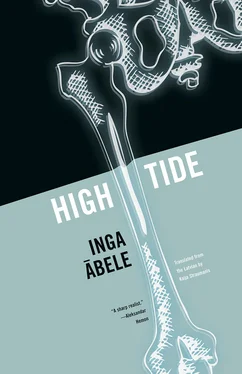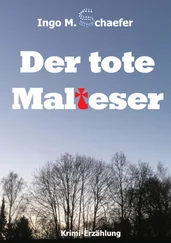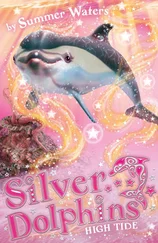People say they’re afraid of the dead. It doesn’t even occur to Ieva to be afraid. It’s her Aksels! So beautiful and pale. Now and then she caresses his head. His jaw is set in a stubborn expression. Eyelids fine as silk, frozen to his irises. The stubble on his face and his hair keep growing. His hands are positioned in a ridiculous way, Aksels never held his hands like that! Ieva discovers that the index fingers of his hands are tied together with fishing line. She carefully cuts it away because she’s convinced it’s hurting him.
They’ve done an autopsy. The front of his sweater has been cut open and then sewn up with surgical thread. Aksels is flat as a board — they probably took a lot of him for themselves. Ieva hopes they’ve left his heart untouched.
She spends each night with Aksels. Touches his cheek, lights a candle she found in a kitchen drawer. Drinks brandy straight, pulls it into herself like fire.
There’s a full moon. It flashes its white face over Aksels. During the day there’s sun. A few flies crawl around Aksels in the morning light. But January flies are so groggy that they don’t even think to feed on him. They just bask on him in the warm sun.
Gran shows up, sits in the kitchen and cries, forces Ieva to eat something.
Andrejs’s father drives out and slaps Ieva across the face and calls her a whore who’s ruined his only son. Andrejs’s mother and Gran cook together, and the kitchen fills with thick steam and sniffling. Andrejs’s father drinks Ieva’s brandy.
Later that night everyone goes looking for Ieva and finds her lying next to Aksels, her eyes strangely bright. She’s running a fever.
The next day Lūcija arrives — as usual, whenever Ieva truly needs saving. She’s brought Monta with her. Monta showers her mother with kisses, then climbs into the bed next to Aksels, pokes his cheek with a finger, then immediately pulls back and starts to cry.
“Why is Ocela so cold?”
Lūcija says:
“Why are you keeping him here? Are you out of your mind?”
Ieva answers defensively:
“They brought him here.”
Nothing here is as it should have been. This mess, this commotion, it’s ridiculous. Aksels wanted to rest in peace. And now it’s the exact opposite of what he wanted.
Aksels is taken to the morgue, but Ieva is taken to the hospital — her toes are frostbitten. Two days later there’s a beautiful funeral at the old manor house. Aksels is buried in the local cemetery next to his mother, Stase.
The sobbing is an intangible sea. When a wave hits, Ieva cries. It’s not a voluntary action — not in any way. It’s as if she’s standing in the water with a large, open wound, a sore. When a wave hits, it carries salt with it and it hurts, and the tears come. It’s easy to cry when washing the floor. Then Ieva is bent over and the tears fall straight down instead of in her sinuses, or her throat, or elsewhere. Her tears grow heavy right there on her lashes and drip down. Ieva washes the floor with them.
Ieva works like a scientist in a submarine of tears, matter-of-factly executing the necessary functions for survival — she eats, sleeps, pees. Aksels watches from everywhere. Ieva is embarrassed.
From then on Ieva starts every meal by silently offering the first bite to Aksels. She eats inside of Aksels. Ieva herself is Aksels.
Aksels is also the full moon. When is stands silent and large over Earth, he’s there. At 4 a.m. on the night of every full moon. Before his death, silence was silence. After it, silence became woven with thoughts. If she listens carefully, Ieva can sense Aksels is contemplating there in the silence. She lies in bed, afraid to move, and takes part in his thoughts. It doesn’t have a definite form or direction; Aksels, streaming through the moonlight, contemplates in every direction, intelligently and achingly.
Dung flies — big, fat, active — that’s what real life looks like!
You can only keep something sacred in an abstract form. And put it in the left chamber of your heart. Any icon placed in the picture frame of life looks blasphemous, even though blasphemy is really just life itself. When you cry, someone somewhere is definitely laughing. That’s the way it is and there’s nothing you can do about it. Except store Aksels’s flat, helpless body in your memory.
Helplessness. That’s the second thing Ieva can’t stop thinking about. A child’s helplessness, an animal’s helplessness, a sick person’s helplessness, and an elderly person’s helplessness when faced with an intelligent and capable mind. When faced with strength. Maybe that’s where all faith, hope, and trust hide?
Whose hands will you wind up in when you’re helpless?
From then on time splits — time before Aksels’s death and time after it. Text messages received before and texts messages received after. The date on the packaging of a dried up loaf of bread is before , and Ieva shudders even before she’s read it, even before she knows what she’s read.
And what can she do now that she’s left alone without Aksels? Hope that some day she’ll be overcome by that somber valley to which he took off like a bird with a broken wing? Ieva would know how to die right then and there, but she wasn’t convinced that she would die in the same place as Aksels. Ieva looks for Gran’s Bible — it was supposed to be the book meant for the times fate separated two people and they needed a guide to find their way back to each other. The Bible was in old print, and nowhere did it explain how to die with another person.
Ieva went to church. The services dragged on, the pastor talked about the rich and the poor, and who had a harder time getting into Heaven than threading a camel through the eye of a needle. Everyone repented their sins together, the pastor forgave them in the name of the Lord, and then fed the hungry in two lines with the body and blood of Christ. Ieva swallowed it all and believed, but no matter how achingly she sang along, cried, prayed, and ate, she didn’t see Aksels anywhere in this place. She left while the pastor ground out his last phrases about Christ, whom the pastor obviously loved. What was Christ to Ieva when she loved Aksels? Aksels wasn’t here.
Ieva also searched in the forest. In the trees, in the sky. Aksels wasn’t there.
He wasn’t in the cemetery, either.
He wasn’t anywhere.
Only in as much as his body lay those few nights next to Ieva, completely dead, cold, and beautiful. And in as much as his soul appeared at 4 a.m. on a full moon like a thought weaving through the room.
And maybe not even that was true.
Ieva suddenly understood death.
She understood — there simply wouldn’t be anything more.
The world would never have another person like that.
Somehow she had to live on. Ieva had heard stories about Buddha who, when he saw his first dead body, was unable to go on living and sat under a tree, where he had a revelation that eased suffering. Ieva didn’t have a revelation. She burned a few of Aksels’s things, put his photos and documents in envelopes, and didn’t know which envelope held the meaning of life. The reason to be.
The thread of substance had broken. Ieva continued to exist in body, but only so Monta wouldn’t be left alone.
And every now and then she told her daughter a little story about the time when Ocela had still been with them.
Tell someone about your dreams.
Always, definitely tell someone about the dreams you’ve dreamt. Once you undress the dream with words, you’ll discover the meaning of it.
Explain the dream using the shortest possible words.
Once you undress the dream with words, you’ll see your delusions in the words.
Explain the dream using the simplest words possible.
Читать дальше












